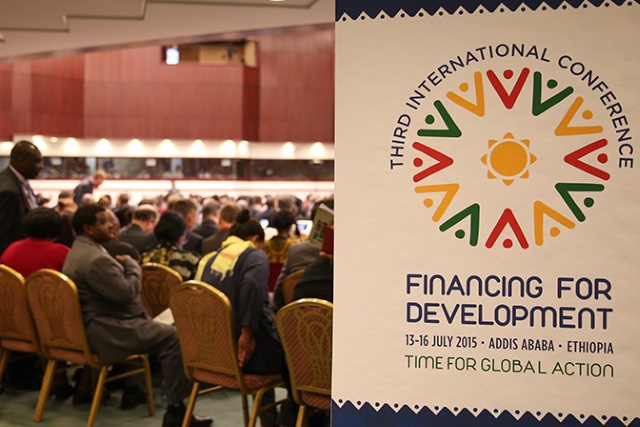Development of a more just world requires financing.
Statement by Mary Robinson, President, Mary Robinson Foundation – Climate Justice.
The Addis Ababa Action Agenda, the outcome document agreed at the Third Financing for Development Conference which took place in Addis Ababa from 13-16 July 2015, is an important component of the Post 2015 Development Agenda. It was tasked with creating a framework for financing all three dimensions of sustainable development; environmental, economic and social. I am particularly pleased to see respect for human rights and the strong and consistent emphasis on gender equality and women’s empowerment throughout the document.
Addis should have been a critical step in unlocking the necessary financial support not just from aid, but also tax reform and investment to implement the Sustainable Development Goals (SDGs). Unfortunately the Action Agenda falls short of committing concrete proposals to reshape the global framework for financing development; its business as usual approach does not match the aspirations of the post 2015 Development Agenda and SDGs.
The Addis outcome document identifies the challenges of financing development and proposes some new institutions. But it falls short of delivering solutions. It is simply not possible to make the transition to sustainable development without access to finance; the outcome document fails to show where this finance will come from. The outcome of the Addis meeting does not send a message of solidarity to the people and communities around the world already experiencing the negative impacts of climate change on their development; this is of grave concern as these people need climate justice.
Developing countries, many of whom are already demonstrating transformative leadership, need access to finance to partake in the transition to low-carbon climate resilient development. Without access to finance to transform their economies they will have no choice but to rely on dirty fossil fuels. This would put the world on a dangerous pathway to more than 2oC degrees of warming, and contribute to even greater inequality between the rich countries who can afford to make the transition and poorer countries that get left behind.
World leaders now have a short period, the remainder of 2015, to demonstrate a clear commitment to ethics over vested interests and solidarity over narrow self-interest. It is in everyone’s interest to forge a financing solution that respects our common home and all who live in it.


